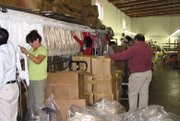State Labor Officials Conduct Garment-Shop Raids
State officials launched raids of small garment factories scattered throughout California in search of business owners believed to be violating labor and tax laws.
The raids began in Los Angeles on Aug. 2, when seven multi-agency teams with five government officials each closed down nine clothing makers, confiscated hundreds of bags of apparel and issued citations for violations that ranged from not having a current garment manufacturing license to not having workers’ compensation.
During the rest of the week, surprise visits were made to garment factories in San Francisco and San Diego.
On Aug. 3, the multi-agency coalition closed five San Francisco garment factories, cited for alleged labor law violations.
The raids were part of the new Economic and Employment Enforcement Coalition announced July 29 by Gov. Arnold Schwarzenegger (see page 10) to root out businesses violating labor and tax laws.
The teams fanned throughout downtown Los Angeles, checking the records of garment contractors working in and near the Fashion District. The businesses were selected for a number of reasons.
“We decided whom to inspect based on tips from local enforcement officials, local government agencies, and looking at people who had past complaints and referrals,” said Jehan Flagg, a spokesperson with the California Labor and Workforce Development Agency.
Some raids were foiled when managers or workers activated fire alarms to evacuate factories being inspected.
One factory that officials closed down was Ice Tea Inc., a small garment manufacturer and wholesaler that makes women’s tops at 1506 S. Santa Fe Ave. and sells them wholesale at 420 E. 11th St.
This was not the first visit by state officials to this factory. Last year, officials discovered that the factory’s owner, Heui Jang, did not have a valid garment manufacturing license, said Renee Bacchini, a spokesperson for the state Department of Industrial Relations.
During a March 17 inspection to check for a garment manufacturing license, officials discovered that Jang was employing 20 sewers and cutters as independent contractors even though he owned the sewing machines and they only did work for him, said Jose Millan, deputy secretary of the California Labor and Workforce Development Agency, who was at the Ice Tea raid.
“He was paying no taxes on his workers then,” Millan said. “The good news is that they are now employees and he is paying their workers’ compensation insurance and other taxes. The bad news is they have to buy some of their own equipment, such as scissors and the little foot near the needle of the sewing machine. So he doesn’t quite have it right yet.”
After that initial visit, Jang was fined $2,000 for not having a license and $17,000 for paying his employees in cash and not deducting taxes. State officials closed the Ice Tea factory and confiscated 75 bags of clothing.
Jang paid his $2,000 fine for not having a license but still has not paid his $17,000 fine, Millan said.
Jang, through his attorney, Mark Brutzkus, said he never received a hearing notice for the $17,000 fine, as required by state law.
After the Aug. 2 visit, Jang’s factory was closed a second time. Officials spent more than one hour packing up a long rack of women’s blouses and tops and placing them into 38 plastic bags for confiscation.
Jang has 15 days to appeal the confiscations, Millan said. Jang is likely to do so, according to Brutzkus, who said his client told him the blouses were manufactured outside of California and should not be subject to confiscation. Brutzkus did not know where the blouses had been made.
All confiscated goods are taken to a warehouse owned by Los Angeles nonprofit Shelter Partnership Inc., which gathers clothing for various shelters. Once the appeal period expires, the clothing will be donated to the shelters.
During the most recent raid, Jang was fined $6,700 for failure to have a garment manufacturing license and $2,600 for record violations.
The state issued only a partial list of factories closed during the week of raids. Other Los Angeles factories closed were Robella Inc., a silk-screening operation at 1807 E. Olympic Blvd. that was shuttered for not having a business license, and M & M Fashion, a business at 1320 E. 16th St. that also did not have a garment manufacturing license.






















